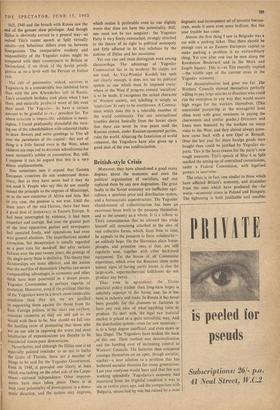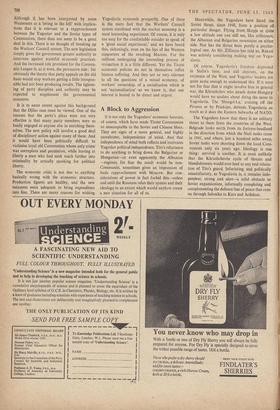British-style Crisis
Moreover, they have abandoned a good many dogmas about the economic and even the political organisation of socialism, and not replaced them by any new dogmatism. The great faults in the Soviet economy are inefficient agri- culture, a spurious price and distribution system, and a bureaucratic superstructure. The Yugoslav abandonment of collectivisation has been an enormous boon both to the peasants themselves and to the country as a whole. It is a tribute to Tito's commonsense that he allowed this while himself still remaining attached to the idea of vast collective farms, which, from time to time, he appeals to the peasants to form voluntarily— an unlikely hope. On the Slavonian plain horse- ploughs, and primitive ones at that, are still regularly seen, together with other backward equipment. Yet the lesson of all Communist experience, which even the Russians show some uneasy signs of having partly learnt, is that the large-scale, superrnechanised kolkhozes do not produce any better.
Thus even in agriculture, the .Titoite practical policy (rather than long-term hope) is infinitely superior to the Soviet one. So it has been in industry and trade. In Russia it has never been possible fOr the planners or factories to have any real idea of What anything costs to produce. To start with, the legal raw material market is priced in a quite unrealistic way. And the distribution system—even for raw materials— is to a large degree unofficial, and even more or less illegal. The Yugoslays have broken the back of this one. Their method was decentralisation and the handing over of increasing control to Workers' Councils. The factories then competed amongst themselves on an open, though socialist, market—a neat solution to a problem that has bothered socialist theorists for many generations. Last year everyone would have said that this was working splendidly. Yugoslavia's economy had recovered from the frightful condition it was in ten or twelve years ago, and the comparison with Bulgaria, untouched by war but ruined by a most dogmatic and incompetent set of terrorist bureau- crats, made it seem even more brilliant. But this year trouble has come.
Almost the first thing I saw in Belgrade was car with a parking ticket. That there should be enough cars in an Eastern European capital to make parking a problem is an extraordinary thing. Yet row after row can be seen along the Revolution Boulevard and in the Marx and Engels Square. This is—as Tito recently implied —the visible sign of the current crisis in the Yugoslav economy.
For decentralisation had gone too far. The Workers' Councils showed themselves perfectly willing to pay large salaries to directors who could run the enterprise in any way that would secure high wages for the workers themselves. (This unsocialist pampering at the managerial level often went with great meanness in paying the charwomen and similar grades.) Directors and fixers were financed by the workers on many visits to the West, and they almost always some- how came back with a new Opel or Renault. Over the last year far more foreign goods were bought than could be justified by Yugoslav ex- ports. This is the basic reason for the party's new tough measures. Tito's speech of May 6 at Split marked the setting-up of centralised commissions, under a Federal Commission, with legalised powers to intervene.
The crisis is, in fact, one similar to those which have afflicted Britain's economy, and dissimilar from the ones which have produced the—far worse—economic crises in Poland and Hungary. The tightening is both justifiable and sensible. Although it has been interpreted by some Westerners as a 'swing to the left' with implica- tions that it is relevant to a rapproachment between the Yugoslav and the Soviet types of Communism, there does not seem to be a great deal in this. There is no thought of breaking up the Workers' Council system. The new legislation simply gives the government greater authority to intervene against wasteful economic practices. And the increased role promised for the Commu- nist League is, as it were, the persuasive side: for obviously the theory that party appeals on the old basis would stop workers getting a little irrespon- sible had not been producing results. The tighten- ing of party discipline and authority may be expected to supplement the governmental measures.
It is to some extent against this background that the Djilas case must be viewed, One of the reasons that the party's pleas were not very effective is that many party members were as busily engaged as anyone else in enriching them- selves. The new policy will involve a good deal of disciplinary action against many of these. And it would have been politically difficult to victimise loyal old Communists whose only crime was corruption and peculation, while leaving at liberty a man who had sunk much further into criminality by actually speaking for political liberty.
The economic crisis is not duo to anything basically wrong with the economic structure. Production figures are healthy, and the new measures seem adequate to bring expenditure into line. There are many reasons for wishing Yugoslavia economic prosperity. One of these is the mere fact that the Workers' Council system combined with the market economy is a most interesting experiment. Of course, it is only too easy for the comfortable outsider to speak of a 'great social experiment,' and we have heard this, sickeningly, even on the lips of the Western supporters of the revolting Maoists. For the millions undergoing the interesting process of vivisection it is a little different. Yet the Titoist economic policies do not in themselves inflict human suffering. And they are so very relevant to all the questions of a mixed economy, of workers' ownership, of a socialisation which is not 'nationalisation' as we know it, that our interest is bound to be direct and urgent.



































 Previous page
Previous page